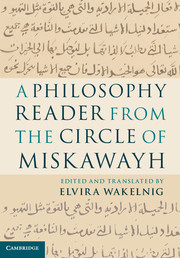Appendix 2
Published online by Cambridge University Press: 30 September 2021
Summary
A continuous excerpt from the Kitāb al-Ḥaraka (Ankara, Univ., MS Ismail Saib 1 1696, 99bl-100b2; Istanbul, Süleymaniye Kütüphanesi, MS Haci Mahmud 5683, fol. 128a5-129al7) with four parallels in the PR; due to shortage of space the text of MS Ismail Saib 1 1696,100a3-bl, and MS Haci Mahmud 5683, fol. 13a3-129 , which is more or less identical to PR, passages (12-13), is not reproduced (see the indicated passages and the corresponding apparatus).
chance are not causes for the being of the heavens, then the first intellect and nature are causes for the being of the heavens. He has already examined that critically in the second chapter of the Physics where he describes the causes, classifies them and distinguishes the efficient cause from the other causes. Then he has described how many causes [there are] which must be connected to the being of the whole world, what ‘cause’ means and how they must be distinguished from each other. He says that the principles which cause natural motion are two. By natural motion he means something moved by itself, not by skill or will. Then he says that one of the principles causing motion is not natural, that is to say there is no principle of motion in it. This is what moves perpetually without being moved, like the thing which is the First of all things and does not move at all. The philosopher means by his statement that the First Thing is the starting-point of the being of the whole world and is the mover of the spheres and the organiser of their order. He has already examined this critically in the second chapter of the Physics. He says that motion enters all things perpetually, establishes that by compelling proofs and [says that] effortless motion can only be in the moving bodies as circular motion. In order to show that, he starts his argumentation with a classification of motion and explains how it takes place. Afterwards he describes the linearly [moving] and the rotating bodies and says that it is not possible that there is any magnitude or anything among the natural linearly [moving] bodies or the rotating bodies which is infinite with regard to magnitude.
- Type
- Chapter
- Information
- A Philosophy Reader from the Circle of MiskawayhText, Translation and Commentary, pp. 486 - 488Publisher: Cambridge University PressPrint publication year: 2014

